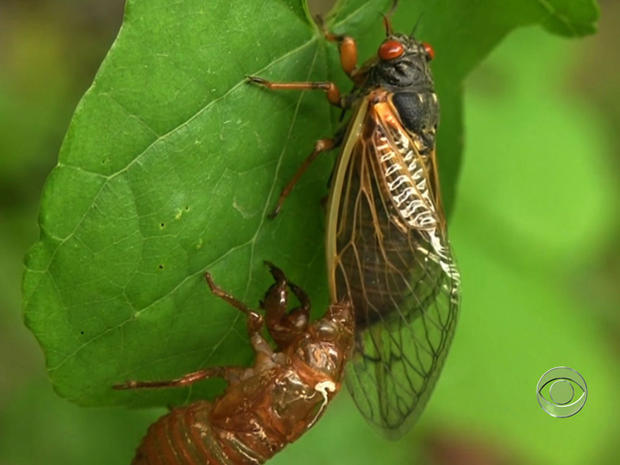They're back! Cicadas to emerge from their hiatus
(CBS News) SHORT HILLS, N.J. - Everything has its season, everything has its time. And for cicadas, the time is now. After living underground on the East Coast for 17 years, the insects -- billions of them -- are about to resurface. They'll be making plenty of noise ... and love.
A preschool class is walking along the nature trail. "See if you can find one of those cicadas and if you find one point to it and let us know," an adult instructed them.
These preschoolers at the Cora Hartshorn Arboretum in Short Hills, New Jersey are getting their first glimpse at one of the marvels of nature. Like clockwork, the cicadas, who belong to what scientists call "brood II," are digging their way out.
John Cooley is a researcher at the University of Connecticut. He has studied the life cycle of cicadas for 20 years.
East Coast about to be overrun by billions of cicadas
Noisy cicadas come back to life after years underground
"They synchronize their development, they have these long life cycles," he said. "And when they come out, they come out in massive numbers."
So what is triggering that? "They are counting the seasons because they're down underground, feeding on the roots, and they're counting the number of times that it leafs out," Cooley explained. "And when you get to the right spring, they're monitoring the soil temperatures, and when it hits 64 or so degrees Fahrenheit, out they go."
The eastern United States is the only place in the world where the 17-year cicada cycle occurs. An estimated one million cicadas per acre will blanket the region from North Carolina to Connecticut.
Within days of emerging, the cicada nymph sheds its skin and morphs into an adult. Before dying, the rest of its 4 to 6 week life is devoted to finding a mate and making babies -- which is where all the racket comes in. A chorus of males singing to attract females can reach 90 decibels -- as loud as lawnmower. That's due to their hollow abdomens that amplify their love songs.
"So the male is calling a little down slur," said Cooley. "And then about a third of a second after he starts that down slur, the female clicks her wings, just like that. It's a little quiet sound and a little movement."
In a couple months, the buzzing will be gone. And the next time these pre-schoolers hear it, they'll be twenty-somethings.
Roy Troutman, Batavia, Ohio
Lang Elliott, musicofnature.com
Chris Simon


